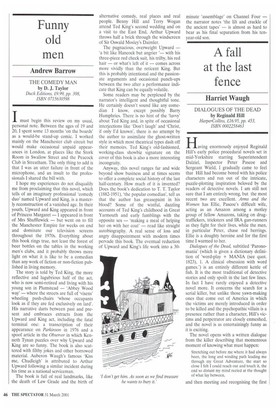Funny old men
Andrew Barrow
THE COMEDY MAN by D. J. Taylor Duck Editions, £9.99, pp. 308, ISBN 0715630598 Imust begin this review on my usual, personal note. Between the ages of 19 and 20, I spent some 13 months 'on the boards' as a would-be stand-up comic. I worked mainly on the Manchester club circuit but would make occasional unpaid appearances in London, at places like the Stork Room in Swallow Street and the Peacock Club in Streatham. The only thing to add is that I was an utter failure in front of the microphone, and an insult to the professionals I shared the bill with.
I hope my experiences do not disqualify me from proclaiming that this novel, which tells of an imaginary professional 'comedy duo' named Upward and King, is a masterly reconstruction of a vanished age. In their youth, Upward and King appeared in front of Princess Margaret — I appeared in front of Mrs Shufflewick — but went on to fill the Manchester Empire for weeks on end and dominate our television screens throughout the 1970s. Everything about this book rings true, not least the forest of beer bottles on the tables in the working men's clubs, and it probably throws more light on what it is like to be a comedian than any work of fiction or non-fiction published in living memory.
The story is told by Ted King, the more reflective and lugubrious half of the act, who is now semi-retired and living with his young son in Plumstead — 'Abbey Wood way' — where the streets are full of 'vixens' wheeling push-chairs 'whose occupants look as if they are fed exclusively on lard'. His narrative darts between past and present and embraces extracts from the Upward and King act, including the fatal terminal one: a transcription of their appearance on Parkinson in 1976 and a spoof article in the Observer in which Kenneth Tynan puzzles over why Upward and King are so funny. The book is also scattered with filthy jokes and other borrowed material. Auberon Waugh's famous 'Kiss me, Chudleigh' is attributed to Arthur Upward following a similar incident during his time as a national serviceman.
The book is full of real landmarks, like the death of Lew Grade and the birth of alternative comedy, real places and real people. Benny Hill and Terry Wogan attend Ted King's second wedding and on a visit to the East End, Arthur Upward throws half a brick through the windscreen of Sir Oswald Mosley's Daimler.
The pugnacious, overweight Upward — 'a bit like Hancock but angrier '— with his three-piece red check suit, his trilby, his red hair — or what's left of it — comes across more vividly than the reticent King. But this is probably intentional and the passionate arguments and occasional punch-ups between the two after a performance indicate that King can be equally volatile.
Some readers may be perplexed by the narrator's intelligent and thoughtful tone. He certainly doesn't sound like any comedian I know, except possibly Barry Humphries. There is no hint of the 'Itivvy' about Ted King and, in spite of occasional interjections like 'Don't laugh' and 'Christ, if only I'd known', there is no attempt by the author to assimilate the ghost-written style in which most theatrical types dash off their memoirs. Ted King's old-fashioned, working-class showbiz signature on the cover of this book is also a more interesting incongruity.
Anyway, this novel ranges far and wide beyond show business and at times seems to offer a complete social history of the last half-century. How much of it is invented? Does the book's dedication to T. T. Taylor (1882-1951), 'the popular comedian', tell us that the author has greasepaint in his blood? Some of the wistful, dazzling accounts of Ted King's childhood in Great Yarmouth and early fumblings with the opposite sex — 'making a meal of helping her on with her coat' — read like straight autobiography. A real sense of loss and angry disappointment with modern times pervade this book. The eventual reduction of Upward and King's life work into a 30 minute 'assemblage' on Channel Four — the narrator notes 'the lilt and crackle of the ancient tapes' — is almost as hard to bear as his final separation from his tenyear-old son.


























































































 Previous page
Previous page